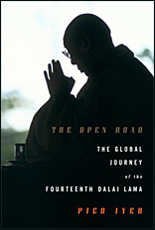"A religious teacher who is telling people not to get confused or distracted by religion; a Tibetan who is suggesting that Tibet does not have all the answers; a Buddhist who, more and more, is urging foreigners not to take up Buddhism but to study within their own traditions, where their roots are deepest: at the very least, something quite radical is being advanced, it seems. The world at the beginning of the new century is more divided than I have ever seen it and its strongest power is fractured by loud disputes; in the middle of this, the head of Tibetan Buddhism is urging people not to listen to doctrine, which can so often be a source of divisions of its own, but to push behind it to something human, in which ideas of 'clashing civilizations' can seem remote.
"As the burly Tibetan walks out into the broad sunlight — people are holding up signs saying FREE TIBET along his path and waving the Tibetan flag, now banned in Tibet — I realize there's something incongruous about this skeptical journalist and nonbelonger (myself) devoting so much of my time to trying to figure out what this man is saying.
"But the Dalai Lama impresses, or disarms, me, by doing away with many of the categories with which we imprison ourselves. The only truths that can possibly make sense to us, he suggests, apply to all human beings, as much as Pythagoras's theorem or the laws of thermodynamics do; if they pertain only to a specific tradition or culture, they're not human truths at all. And the only thing that an Easterner — or Westerner — can offer is a window on these truths that allows the rest of us to see them more clearly than we have done before. To someone like me, who's grown up in many cultures but refused to believe that lacking a physical home means lacking an inner center, this is all as encouraging to hear as the idea that we don't have to define ourselves by differences.
"I follow along as he moves down the white-gravel paths of central Nara and notice, as people reach toward him to try to get a blessing or a handshake, how he is switching, as always, at lightning speed from monk to head of state to philosopher-scientist to regular man. But what is more striking, I realize, is that he's pushing all these roles together, as if they were all intertwined, to see how one might throw light on the others. I don't know many monks who are so keen to affirm only what stands up to scientific testing. And there are even fewer politicians who try to speak from the collected stillness and attention of a monk. Pope John Paul II, the Dalai Lama's good friend, is also traveling more and more in the global order, using planes and cars to take him everywhere; but when he travels, he tends to visit fellow Catholics, to proclaim his faith and to offer doctrinal guidance. The Dalai Lama, by comparison, seems to exult in meeting people from different traditions than his own — Catholics, neuroscientists, even Maoists — and seeing what they have in common beneath their designations.
"I can't help but think this is an interesting response to an age in which some kill others in the name of Allah, some in the name of the Christian God. But just as I am thinking all this, I see the tanks that surrounded me in Ethiopia not long ago, the armed soldiers I met in Arabia who were scrambling after pennies. I remember the guerrillas who came into the room where I was sitting in El Salvador, during its civil war, the shacks I saw in Soweto where philosophical ideas seemed unlikely to bring any food to the table. I can't say, after twenty years of covering wars and revolutions as a journalist, that any one man is likely to have all the answers (and the Dalai Lama, I know, would not say that either); it's the questions he puts into play that invigorate."
